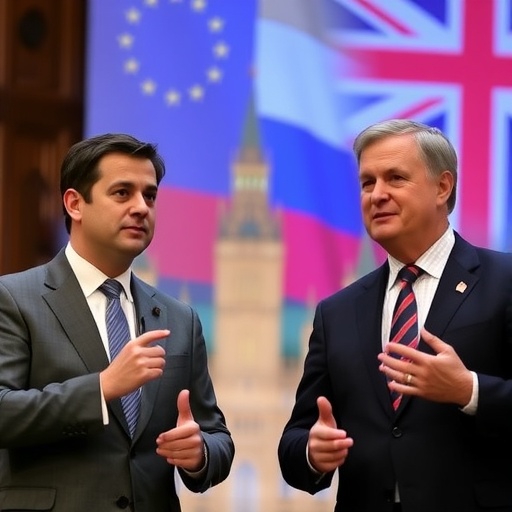Starmer and Zelensky Unite 24 European Leaders in London to Launch Aggressive Russian Oil Sanctions Campaign
In a bold escalation of international pressure on Moscow, UK Prime Minister Keir Starmer and Ukrainian President Volodymyr Zelensky rallied a coalition of two dozen European leaders at a high-stakes London summit on Wednesday, announcing a unified pledge to eradicate Russian oil and gas from global markets. The move, dubbed the Coalition of the Willing, aims to mirror and amplify U.S.-led Russian oil sanctions, targeting the Kremlin’s war chest that funds the ongoing invasion of Ukraine.
- London Summit Seals Pledges to Ban Russian Energy Imports by 2025
- Zelensky’s Video Address Ignites Passion for Ukraine‘s Fight Against Aggression
- Starmer Positions UK as Sanctions Leader, Drawing on US Model for Success
- European Heavyweights Commit Billions to Enforce Russian Oil Ban
- Global Ripples: How New Sanctions Could Reshape Energy Markets and Hasten Ukraine Peace
The summit, held at Lancaster House amid heightened security, marked a pivotal moment in the West’s strategy to starve Russia’s economy of its primary revenue source. Zelensky, addressing the gathering via video link from Kyiv due to security concerns, delivered an impassioned call to action, stating, “The blood of Ukrainian civilians stains every barrel of Russian oil sold on world markets. Today, we draw a line in the sand—together, we will dry up this river of death.” His words resonated deeply, galvanizing commitments from nations including Germany, France, Poland, and the Netherlands to accelerate the phase-out of Russian energy imports.
Starmer, hosting the event as part of the UK’s renewed diplomatic push post-Brexit, emphasized the urgency: “We’ve seen the devastation in Ukraine—cities reduced to rubble, families torn apart. Russian oil revenues have ballooned to over $100 billion since the invasion began in February 2022, according to the International Energy Agency. It’s time to hit them where it hurts most.” The announcement comes at a critical juncture, with global energy prices volatile and winter looming, yet leaders framed the sanctions as both a moral imperative and a strategic necessity to weaken Vladimir Putin’s grip on power.
London Summit Seals Pledges to Ban Russian Energy Imports by 2025
The heart of the London summit was a series of binding commitments from the 24 participating nations, forming the backbone of the Coalition of the Willing. Under the agreement, signatories vowed to impose comprehensive Russian oil sanctions that would effectively remove 90% of Russia’s seaborne crude exports from international trade routes by the end of 2025. This includes banning imports at ports, prohibiting insurance for Russian-flagged tankers, and coordinating with global shipping giants to reroute supplies away from Moscow-aligned buyers.
European Commission President Ursula von der Leyen, a key attendee, detailed the logistical roadmap during a press briefing. “We’ve already reduced our dependence on Russian gas by 80% since the war started,” she noted, citing EU data. “Now, with this coalition, we’ll target oil—the lifeblood of Russia’s military machine. Germany alone imported 1.4 million barrels per day from Russia pre-invasion; today, that’s zero, and we’ll ensure it stays that way for all allies.”
The pledges extend beyond Europe, with invitations extended to non-EU partners like Norway and Turkey, who expressed interest in joining the fray. Statistics from the summit underscored the scale: Russia’s oil exports, valued at $180 billion annually before sanctions, have dipped only 20% due to discounted sales to India and China. The Coalition of the Willing aims to close these loopholes by pressuring third-party nations through diplomatic channels and trade incentives.
One surprising angle emerged from smaller nations: Baltic states like Lithuania and Latvia, long wary of Russian influence, proposed innovative enforcement mechanisms, including satellite monitoring of oil tankers and blockchain tracking for energy transactions. “We’ve lived under Moscow’s shadow for centuries,” said Lithuanian President Gitanas Nausėda. “These Russian oil sanctions aren’t just policy—they’re our shield.” This grassroots momentum added emotional weight, transforming the summit into a symbol of transatlantic solidarity.
Zelensky’s Video Address Ignites Passion for Ukraine‘s Fight Against Aggression
President Zelensky‘s virtual appearance was the emotional core of the proceedings, his gravelly voice cutting through the room as he recounted fresh atrocities in Ukraine. Flanked by images of bombed-out Kharkiv neighborhoods, he urged the leaders: “Every day without action, Russia refines more oil to buy more missiles. We’ve lost 50,000 soldiers and civilians—don’t let their sacrifice be in vain.” His plea, delivered with the raw authenticity that has defined his wartime leadership, drew a standing ovation and immediate endorsements.
The Ukrainian leader highlighted the human cost, sharing statistics from the United Nations: over 10,000 civilian deaths, millions displaced, and infrastructure damage exceeding $400 billion. “Russian oil sanctions are not abstract—they’re about saving lives,” Zelensky emphasized. He praised the UK’s role, noting that Starmer‘s government has provided £3 billion in military aid since taking office, including advanced air defense systems that have intercepted dozens of Russian drones.
Behind the scenes, Zelensky‘s team lobbied intensively, securing side deals for increased humanitarian aid. France committed €500 million for winter energy support in Ukraine, while Poland pledged to host additional refugee centers. These commitments reflect a broader narrative: the war in Ukraine as Europe’s frontline against authoritarianism, with Zelensky as its unyielding voice. Analysts noted the address’s viral potential, with clips already garnering millions of views on social media, amplifying the summit’s global reach.
Starmer Positions UK as Sanctions Leader, Drawing on US Model for Success
Prime Minister Starmer emerged as the summit’s architect, leveraging his Labour government’s fresh mandate to reposition Britain at the heart of European security. In his opening remarks, he invoked the U.S. example, where President Joe Biden’s administration has capped Russian oil prices at $60 per barrel, slashing Moscow’s revenues by an estimated $30 billion in 2023 alone, per U.S. Treasury figures. “The Americans showed us the path,” Starmer said. “Now, the Coalition of the Willing will walk it together, with the UK leading the charge.”
The UK’s strategy includes enacting domestic legislation to penalize companies dealing in Russian energy, with fines up to £1 million for violations. Starmer also announced a £200 million fund to help allies transition to alternative supplies, partnering with Qatar and Saudi Arabia for increased LNG exports. This forward-thinking approach addresses a key vulnerability: Europe’s energy crunch, which saw gas prices spike 400% last winter.
Critics, including some UK opposition voices, questioned the timing amid domestic cost-of-living pressures. However, Starmer countered with data: “Sanctions have already forced Russia to cut production by 500,000 barrels daily. Extending them will accelerate peace in Ukraine.” His diplomacy extended to bilateral talks, where he secured Norway’s commitment to boost gas supplies by 10 billion cubic meters annually, mitigating potential shortages.
The prime minister’s emphasis on a “whole-of-alliance” effort highlighted the Coalition of the Willing‘s structure—a flexible network unbound by NATO bureaucracy, allowing swift action on Russian oil sanctions. This model, inspired by past coalitions against ISIS, positions Starmer as a pragmatic leader bridging divides in a fractured Europe.
European Heavyweights Commit Billions to Enforce Russian Oil Ban
Major European powers stepped up with concrete financial and policy pledges, solidifying the summit’s outcomes. Germany, under Chancellor Olaf Scholz, promised to divest €15 billion in pension funds tied to Russian energy firms, while accelerating its Energiewende green transition to offset import losses. “We’ve learned the hard way—dependence on Russia was a strategic error,” Scholz remarked, referencing the Nord Stream sabotage that exposed Europe’s vulnerabilities.
France and Italy, historically more reliant on Russian supplies, outlined phased bans: France targeting a full oil embargo by mid-2024, supported by nuclear power expansions, and Italy investing €2 billion in North African pipelines. The Netherlands, a key shipping hub, committed to inspecting 100% of vessels suspected of carrying Russian crude, potentially disrupting the “shadow fleet” of 600 tankers evading current sanctions.
Smaller nations added niche expertise; Estonia proposed cyber defenses against Russian retaliation hacks on energy grids, drawing from its own experiences. Collectively, the commitments total over €50 billion in investments, per summit documents. Quotes from leaders painted a picture of resolve: Dutch Prime Minister Mark Rutte said, “This Coalition of the Willing isn’t optional—it’s existential for Ukraine and our security.”
Challenges remain, including enforcement against non-signatories like Hungary, which has resisted broader EU sanctions. Yet, the momentum is palpable, with the European Central Bank forecasting minimal inflation impact if alternatives are scaled quickly.
Global Ripples: How New Sanctions Could Reshape Energy Markets and Hasten Ukraine Peace
As the Coalition of the Willing takes shape, experts predict seismic shifts in global energy dynamics. With Russian oil comprising 10% of world supply, a coordinated ban could drive prices up 15-20% short-term, according to Bloomberg analysts, but foster long-term stability through diversified sources. India and China, absorbing 80% of redirected Russian exports, face diplomatic pressure to cap purchases, potentially halving Moscow’s windfall.
For Ukraine, the implications are profound: reduced Russian revenues could curb missile production by 30%, per Kyiv’s defense ministry estimates, easing bombardments on civilian areas. Zelensky hinted at reciprocal gestures, like grain export guarantees, to build goodwill with Global South nations wary of Western sanctions.
Looking ahead, the coalition plans quarterly reviews starting in January, with Starmer hosting the next in Brussels. Enforcement mechanisms, including a joint task force with Interpol, aim to plug gaps in the sanctions regime. If successful, this push could not only bolster Ukraine‘s defenses but redefine international norms on economic warfare, ensuring aggressors like Russia pay a steeper price for invasion.
The summit’s legacy, however, hinges on unity. As winter bites and energy demands peak, the Coalition of the Willing must navigate domestic pushback while delivering on promises. In Zelensky‘s words, echoed by Starmer, “The path to victory runs through Moscow’s empty coffers.” With global eyes watching, this alliance could tip the scales toward a freer Europe.








